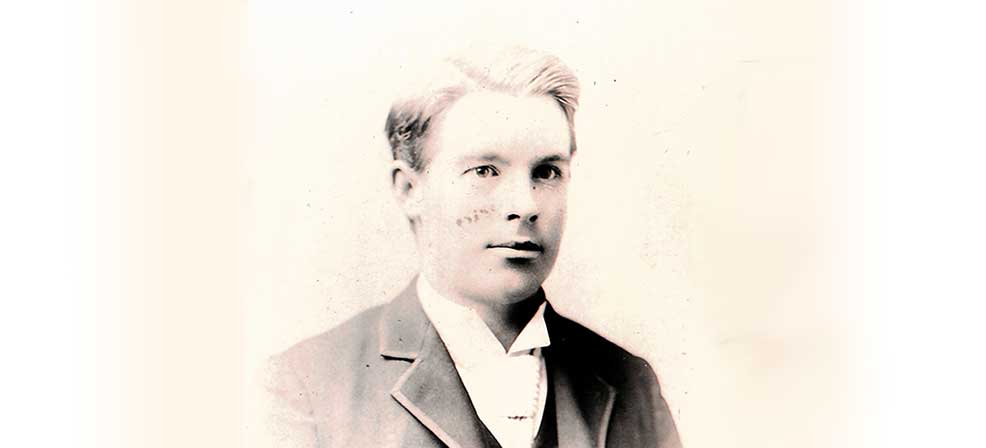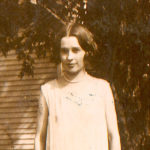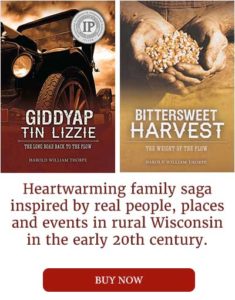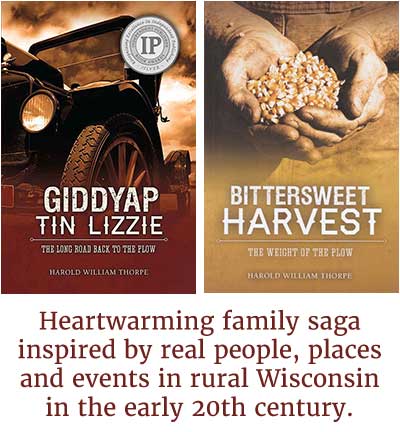Will O’Shaughnessy, the central character in my first two O’Shaughnessy Chronicle books, Giddyap Tin Lizzie and Bittersweet Harvest, was inspired by my grandfather, Will Fitzsimons.
I learned most about Grandfather Fitzsimons from my mother, Laura Annette Fitzsimons, who told many stories about her father and wrote about him in her memoir, From High on the Bluff.
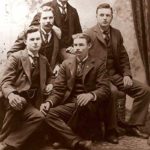
Will, second from top on left, his brother and cousins
Will’s grandfather, Richard Fitzsimons, left the Vale of Avoca in County Wicklow, Ireland with his wife and eight children in 1852, on the heels of the great potato famine. They traveled by ship across the ocean and by train across the continent to Chicago. They secured a team and wagon in Chicago and headed toward land they’d purchased from Territorial Governor Dodge that was about four miles northeast of Mineral Point, Wisconsin.
When they were twelve miles from their destination Richard contracted pneumonia. Knowing he wasn’t going to survive, he told his wife and children to continue on and establish the farm they’d planned for.
Will’s father, Edward Fitzsimons, was eighteen years old when he began farming in America. Eight years later he married Will’s mother, Elizabeth Murrish. Will was born February 21, 1869 and grew up on the family farm. His parents, Edward and Elizabeth, retired to a home in Mineral Point in 1894.
After Will married my grandmother, Elizabeth Stephens, in 1898 continued to live there.
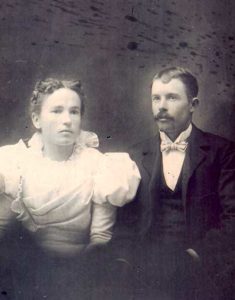
Grandma Elizabeth and Will Fitzsimons wedding picture
Elizabeth was a young school teacher from Linden, Wisconsin and had to quit teaching when she married. At the time, female teachers weren’t allowed to teach after they married. Having always been a town girl, she reluctantly/eagerly/happily/courageously?…moved in with Will and began to experience the rigors of farm life.
Like character Will O’Shaughnessy, my grandfather Will Fitzsimmons loved the outdoor work and the animals and expected to farm all of his life. He had an inquiring mind and ambition to excel. Unlike most farm boys of that time who never went beyond eighth grade, (if that far) Will completed high school and a University of Wisconsin agriculture short-course, receiving instruction from the famous Professor Babcock.
After living on the home farm for five or six years, for reasons I never learned, Will and his family left the farm and moved into Mineral Point in 1903 or ’04. Their first three children were born on the farm, but the last two, my mother, Laura, and her sister, Alice, were born after the family moved to Mineral Point. Unlike his fictional character, Will O’Shaughnessy in Giddyap Tin Lizzie, Will Fitzsimons wasn’t disinherited. He chose to move his family into town, perhaps to earn a better living.
Like Will O’Shaughnessy in Giddyap Tin Lizzie, Grandpa Fitzsimons owned the first Ford dealership in Mineral Point and also ran a lightening rod sales and installation business. But he went one step further than the fictional Will. He opened an implement business, too.
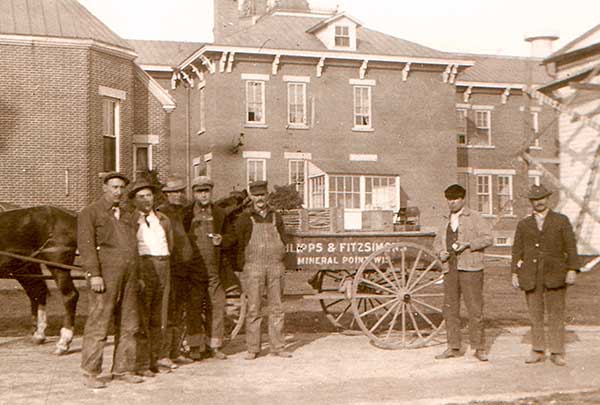
Will Fitzsimons, second from right, and his lightning-rod wagon
Like the fictional Will, my grandfather preferred a buggy ride over an automobile ride. He prized his horses and was said to be the best horseman in the county. Mother wrote that her father loved horses and always wanted “A spanking good team.” She told that he put her and her sister Alice on a horse before they could walk.
When living in town, Will Fitzsimons may not have spent as much time with his horse and buggy as Will O’Shaughnessy did in Giddyap Tin Lizzie, but he would have preferred to. Mother wrote,
“He never felt as comfortable with an automobile as with a good team of horses.” She told about him and her mother driving into town in his Model T for shopping. Because he didn’t like to drive in traffic, he’d park so far from the center of town that they might as well have come by horse and buggy. She wrote, “It would have been faster and saved a mile or two of walking.” She told how he took good care of his horses. He’d say, “Give the horses plenty of oats to get them ready for spring work—just as he’d say, “Give the children plenty of apples to get them ready for winter.”
This was the time when many people believed that an apple a day keeps the doctor away.
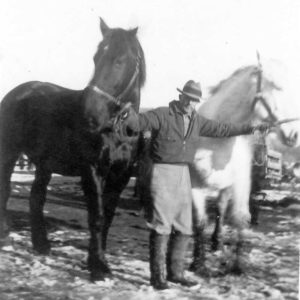
Will Fitzsimons and his work team Maude and Fanny
Will Fitzsimons had a cheery, joyful, and playful disposition. He was known as a very likable fellow. He acquired many friends in whatever community he lived. After his death, a Ridgeway resident who had been a friend of Will, told mother, “Will was the most fun-to be-with guy in town. Everyone liked Will Fitzsimons.”
Will Fitzsimons enjoyed spending time with the youngsters. He’d tease them and play pranks on them—and they loved it. One day when a neighbor boy had stayed past the time he was due at home, Will derived a plan to keep him out of serious trouble. Will found a shingle and put it in his pants, so if he got a spanking it wouldn’t hurt as much. I included this tale in Puppet on a String. I also created a scene in Giddyap Tin Lizzie where Will O’Shaughnessy teaches the town boys how to play mumblety-peg.
Will Fitzsimons loved telling tall tales, many that I’ve attributed to Will O’Shaughnessy in my stories. He’d tell them with such a serious demeanor that no one could possibly think he was fibbing. My mother told about him describing a cousin whose wife he wasn’t fond of, as having jumped over many a pretty flower, and then landing in the middle of a piss-a-blossom. (A vulgar term that some people used to describe the yellow dandelion.)
He also told about leaving the farm home of his girlfriend late one night. It was dark and he couldn’t see anything as he slowly rode along on his horse. Then he heard frogs croaking, “go-round, go-round, go-round.” So he turned and went around. When he came back in the daylight a few days later he saw there was a small lake where those frogs had croaked their warning. He told Mother, “If it hadn’t been for those frogs I’d have ridden into that lake—and I can’t swim. They saved my life.” Mother said he was so serious that no one could possibly doubt him.
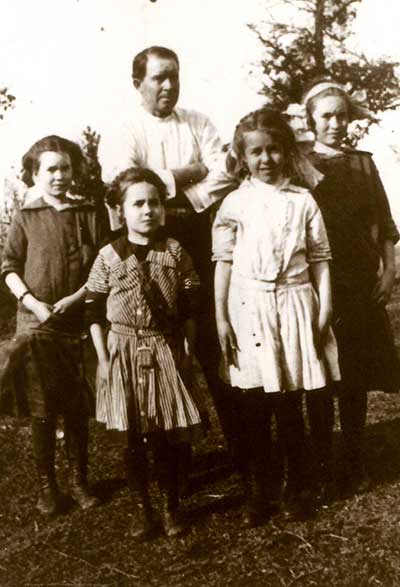
Will and his four girls, left to right—Berniece, Laura (Catherine), Alice (Ruby), and Anne (Sharon)
Will Fitzsimons loved music, and like his fictitious character, Will O’Shaughnessy in Bittersweet Harvest, he enjoyed rolling back the rug for a lively square dance. Both Wills sometimes called the squares for the dances. Mother recalls a mischievous one that he called, “Allemande right and allemande left, all hands round, ladies in the swill barrel upside down.”
My grandfather and the fictional Will O’Shaughnessy loved to fish. When he had troubles Grandfather Fitzsimons would go fishing. He said he could solve problems with a fishing pole in his hands better than anywhere else. Will O’Shaughnessy was the same. When in Bittersweet Harvest he was in deep trouble, having put his friends’ livelihood at risk, the fictional Will headed to the river with his fishing pole.
Grandfather Fitzsimons would fish in the Pecatonica River when he lived in Mineral Point and in the Wisconsin River sloughs after he moved to the Avoca farm, sometimes pulling huge catfish from the water. One time he was fishing on the river when he came across two neighbors, Mr. Temby and Mr. Gutchnect, arguing. Temby was fishing from Gutchnect’s river bank and Gutchnect took issue, saying that Temby should get out. Temby knew he had the right to fish anywhere along the river bank, so he pulled his line from the water, but he didn’t move away. When Gutchnect continued to protest, Temby, who lived upstream a ways, calmly replied, “I’ll just sit here for a spell and wait for my water to come down.” Will thought that was a clever response and aspired for the time when he could use it.
I don’t remember Mother ever criticizing her father. They were ever so close and she loved him dearly. Even though she was a teetotaler herself, she’d tell about the one vice he was known to have—a bit too much fondness for the bottle—without a hint of disagreement and with a twinkle in her eye and a smile on her face. One of her favorite stories was about the day WWI ended, and Will unintentionally, she said, got caught up in the community’s celebration. Her mother had sent Will to town to purchase their monthly sugar allotment. He purchased the sugar, but after celebrating a bit too long, he staggered home with an empty bag, the sugar lost through a hole in the bottom. Mother wrote about it, saying, “- – – although one war was over that day, another erupted in our house.” I certainly had to include this interesting event in my Giddyap Tin Lizzie tale, attributing the misdeed, in greatly expanded detail, to Will O’Shaughnessy.
After living in Mineral Point for sixteen or seventeen years, in about 1920, Will Fitzsimons purchased a farm on the Wisconsin River, two miles east of Avoca (Willow in my stories). Although Will Fitzsimons established the barn cleanliness and inspection conditions required to sell Grade A milk, I never heard that he took leadership in establishing a Dairy Cooperative the way Will O’Shaughnessy did in Bittersweet Harvest.
At first my grandmother Fitzsimons, my mother, and Mother’s sisters weren’t eager about leaving town and moving to the farm, but they soon came to love the country life. I’ve described the peaks and valleys of their farm years in my book, Bittersweet Harvest. Although there was much to love, those were difficult years for farmers. The European countries that needed American farm products during WWI were now producing their own foodstuff, so that market dried up. American farmers began to suffer as prices plummeted, then the Great Depression drove income to the bottom.
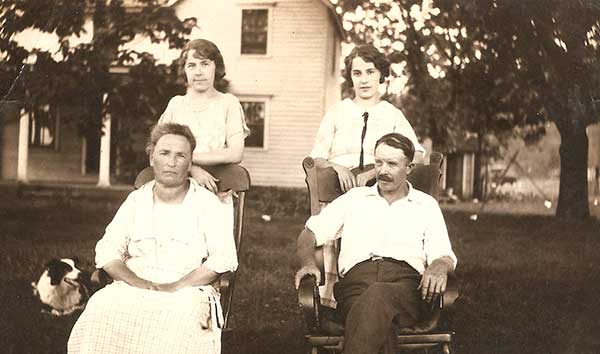
Grandpa Will, Grandma Elizabeth, Alice (Ruby) Laura(Catherine) and Teddy, their heroic dog
Ultimately, Will Fitzsimons and his book character, Will O’Shaughnessy, declared bankruptcy and lost their farms. Will O’Shaughnessy had additional trouble with sick cows. Although there was a hint of information that indicated Will Fitzsimons may have experienced a similar fate, there was nothing definitive to be certain about that. With no income and no savings, both Wills hit dead bottom. But then, in real life and in my fictional tale, their daughters came to their rescue and sustained them until they were able to crawl out of the hole and conclude their lives on an upward path.
Will Fitzsimons was able to return to the farming he loved, and fictional Will O’Shaughnessy went into the cheese business with his niece, Gusta Tregonning. My portrayal of the untamed but resourceful Gusta in Bittersweet Harvest and Puppet on a String paralleled her real life self and real life events. Will Fitzsimons’ niece, Gusta Stephens, did propose they go into the cheese business in Texas, but Will declined, saying he was too old.
If Grandpa could have read my account of Gusta Tregonning’s and Will O’Shaughnessy’s success selling cheese in the Texas oil fields maybe he’d have changed his mind.
Will Fitzsimons and his fictional self, Will O’Shaughnessy, lived through some of the most tumultuous times in United States history—WWI, the Spanish Flu pandemic, the Roaring Twenties, Prohibition, the 1929 Stock Market Crash, the Great Depression, and WWII.
These events brought death, sometimes wealth, and ultimately financial ruin to the real life Will Fitzsimons, my fictional Will O’Shaughnessy, their family, and their friends. But like others of that time, the Fitzsimons and O’Shaughnessy families persevered. They endured the worst and made the best of their fate, always striving for improvement and expecting tomorrow would bring better days.
I never knew Will Fitzsimons—but I wish that I had.
Harold William Thorpe is the author of several books based on his family’s history in Iowa County, Wisconsin including: Giddyap Tin Lizzie, Bittersweet Harvest and the rest of the O’Shaughnessy Chronicles.

